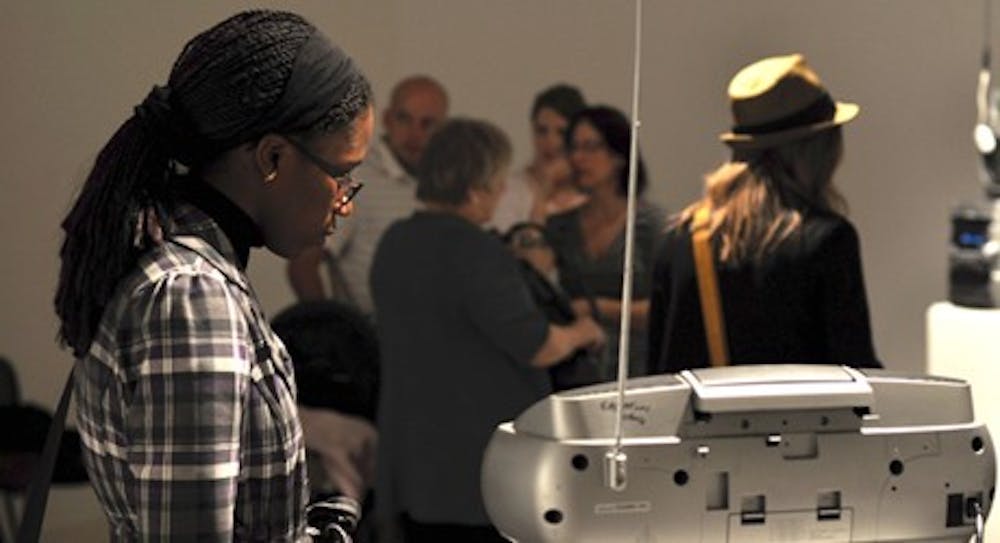When escaping a country because of war, poverty and political strife, refugees don’t get to bring much. But their stories will always travel with them to their new destination.
Now, those stories are reaching a wider audience in “Chorus of Refuge,” a sound installation that opened Tuesday at the ArtSpace West gallery on the West campus.
Composer Jason Cady, an ASU West alumnus, brought the stories to the Valley with radio producers Ann Heppermann and Kara Oehler.
Cady majored in music in ASU’s Interdisciplinary Arts and Performance program and received his master’s degree in composition from Wesleyan University in Connecticut.
He now lives in New York City, where he works for a music foundation and teaches guitar lessons when he’s not composing.
Media and digital arts professor Richard Lerman invited Cady, his former student, to present at the West campus.
“I wanted to bring work that tied into my Documentaries Class (IAP 364) and also wanted to bring work in that was being created by recent ASU West graduates showing the possibilities that exist in creating innovative art after one graduates,” Lerman said in an e-mail.
Heppermann, Cady’s fiancee, and Oehler interviewed the refugees in 2007. They created a documentary called “Immigration: One Thing” as part of the former radio program “Weekend America.” The show examined the lives of newly settled families and one possession they brought from their home countries.
Because radio pieces are so short, Heppermann said they could only use a few minutes of the interviews. She wanted to look for another way to share the stories with the world.
“I thought it would be good to use his skills as a composer, especially for vocal work,” Heppermann said.
The sound installation uses radios of different sizes around the gallery to transmit the stories of six refugees —Somali Bantu, Burundi, Afghani, Sudanese, Iraqi and Burmese — from six different cities across the United States — Portland, Ore.; Phoenix; Amarillo, Texas; Omaha, Neb.; Detroit and Indianapolis.
Visitors can walk through the gallery and listen to the seven-minute composition as a whole or focus on the individual stories.
Loaned radios are provided to the installation creators each time they move the exhibit to a new gallery.
The chorus has three musical movements, titled “Home,” “Journey” and “United States,” to mirror the refugees’ narratives.
Cady said the stories echo one another in certain ways, but are also completely unique. He said an alternative to presenting the refugee’s stories with radios would have been six speakers in a circle on a stage. But that would neither be as visually interesting nor fit the content.
“If you had six speakers surround-sound … that’s not something you’d probably find on a refugee camp, but radios are fairly common thing,” Cady said.
He edited the interviews with pitch-correction software to tune the voices to the chromatic scale and create harmony in the six-channel composition. He was careful, though, to avoid what he called the “Cher effect,” which would make the voices sound Auto-Tuned.
The movements change keys, growing more complex and faster throughout. Usually three or four voices overlap at once, and there are gaps in between.
Cady also tried to balance the frequency spectrum to feature women’s voices more in the piece. He did this because there were more men interviewed.
“The nice thing about having it actually being transmitted live, it turns it into a live performance,” Cady said. “Sometimes there’ll be a certain amount of radio static and noise that makes it different from being totally perfect and predictable.”
The “Chorus of Refuge” was funded by free103point9 Wave Farm, where Cady fleshed out the first movement of the composition. It has premiered all over the country at places like the Chicago Center for the Performing Arts and the School of Visual Arts in New York City.
Heppermann said the composition was amazing and incredible to hear all together.
Cady said the refugees’ stories are important ones to get out there. He added that it will be nice to reach more people as well as entertain on a purely musical basis.
“Chorus” will be open Monday to Thursday through March 3 in ArtSpace West. Reach the reporter at naberra@asu.edu





